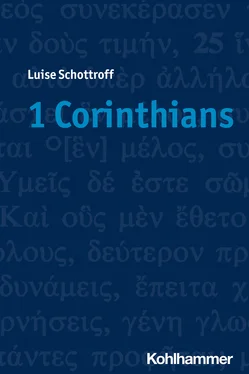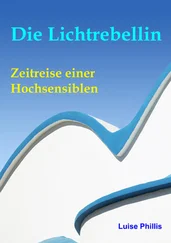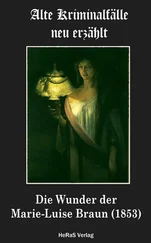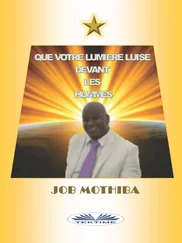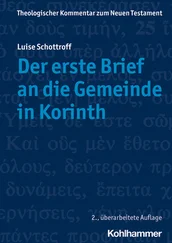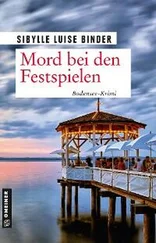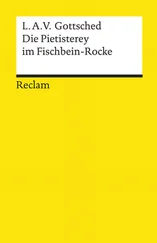Luise Schottroff
1 Corinthians
Revised and with a foreword by Claudia Janssen
Translated by Everett R. Kalin
Verlag W. Kohlhammer
English translation of the 2nd Revised Edition 2022
All rights reserved
© W. Kohlhammer GmbH, Stuttgart
Production: W. Kohlhammer GmbH, Stuttgart
Print:
ISBN 978-3-17-038904-5
E-Book-Formate:
pdf: ISBN 978-3-17-038905-2
epub: ISBN 978-3-17-038906-9
W. Kohlhammer bears no responsibility for the accuracy, legality or content of any external website that is linked or cited, or for that of subsequent links.
1 Corinthian gives us an example how Paul interprets the Tora for Christians from the nations: He tells concretely, sensitively, close to their daily life about the hope against the death. He writes down prayers and songs from the messianic communities of his times. And he contradicts himself&especially in his dealing with women compared to his ideas about how they should be. Luise Schottroff (1934-2015) guides her readers to discover Pauls from anew, digging to his original thoughts through traditional missinterpretations, appropriation, and monopolization.
The English version is based on the German 2nd edition. It was translated by Everett R. Kalin, Professor Emeritus for New Testament at Pacific Lutheran Theological Seminary at Berkely/CA.
Prof. Dr. Dr. h. c. Luise Schottroff (1934-2015) taught New Testament at the Universities of Mainz and Kassel (Germany) as well as at the University of California (Berkeley/CA).
Everett R. Kalin is Professor Emeritus for New Testament at the Pacific Lutheran Theological Seminary at Berkely/CA.
Foreword to the Second Edition
1. Social History
2. Christian-Jewish Dialogue
3. Feminist Exegesis
Foreword
Introduction: Who was Paul?
1. Paul the Jew
2. Paul and the Messiah
3. Paul among his Brothers and Sisters
4. Everyday Life in the Cities of the Roman Empire
5. Paul the Mystic
Commentary
The Date of the Letter and the City of Corinth
1:1–9
1:1–2
1:4–9
Concepts of Time and Eschatology
1:10–18
1:14–17
The Wisdom of this World
Denial of the Crucifixion
1:19–25
1:19–20
Believers in the Messiah from the Nations and their Identity
1:26–31
2:1–16
2:1–5
The »We« of the Congregation
2:6–16
3:1–23
3:1–4
3:5–11
3:12–17
3:18–23
4:1–13
4:1–5
4:6–13
4:14–21
5:1–13
5:1–5
5:6–8
5:9–13
6:1–11
6:9–11
6:12–20
Images from Slavery to Represent God’s Act of Liberation
7:1–40
7:1–7
The Social Practice of Contemptuous Sexuality
7:3–5
7:8–11
Divorces
7:12–16
7:17–24
Slavery
The Torah in 1 Corinthians
7:25–38
7:39–40
8:1–11:1
8:1–13
8:1
Sacrificial Meat—Meat Consumption
9:1–27
9:1–3
9:4–6
Pay for the Teaching of the Torah
9:7–11
9:12–14
9:15–18
9:19–23
Sin and Torah in 1 Corinthians
9:24–27
Sports Competitions
Thoughts of a Woman from a Future Generation
10:1–11:1
10:1–13
10:14–22
Paul’s Theology of the Body
10:23–11:1
11:2–16
11:2–6
11:7–15
11:16
11:17–34
11:17–22
The Congregational Gathering
11:23–26
»For you.« Martyrdom or Sacrifice?
»Do this in remembrance of me«
11:27–34
12:1–31
12:1–3
12:4–11
12:4–7
12:8–10
12:12–27
Body of Christ: You are the body of the Messiah (12:27)
12:28–31
13:1–13
13:1–3
13:4–7
13:8–13
14:1–40
14:1–5
To Speak with God in one’s Native Language (to Speak in Languages)
14:6–19
14:20–25
14:21–25
14:26–33
14:34–38
14:39–40
Resurrection Hope in the Context of the Roman Empire (15:1–19)
15:1–2
15:3–11
Appearances of the Risen One, 1 Cor 15:5–8
15:12–19
15:20–22
15:23–28
15:29–34
15:30–32
15:35–38
15:39–41
15:42–44
15:45–50
15:51–53
15:54–58
16:1–24
16:1–4
The Gifts of the Nations for Jerusalem
16:5–9
16:10–14
16:15–18
16:19–24
List of Abbreviations
Bibliography
Selective Index
I. Old Testament (including the Apocrypha)
Genesis
Exodus
Leviticus
Numbers
Deuteronomy
1 Samuel
2 Maccabeans
Job
Psalms
Proverbs
Wisdom
Sirach
Isaiah
Jeremiah
Ezekiel
Daniel
Hosea
Amos
Malachi
Prayer of Azariah
II. New Testament (excluding 1 Corinthians)
Matthew
Mark
Luke
John
Acts
Romans
2 Corinthians
Galatians
Ephesians
Philippians
1 Thessalonians
1 Timothy
Hebrews
James
1 Peter
Jude
Revelation
III. Intertestamental and post-biblical Judaism
IV. Early Christian Literature
V. Non-Jewish and non-Christian Ancient Authors
Foreword to the Second Edition
The commentary by Luise Schottroff to The First Letter to the Congregation in Corinth appeared in 2013. Therein she offered an easily understandable, true-to-life interpretation of this letter, which directs attention to the living conditions of the Corinthian congregation, offers a political analysis of the power structures underlying the Roman Empire and reveals the daily struggle for dignity of the people in the messianic communities. This second edition offers in extensive sections the unaltered text of the first. The bibliography was enlarged with current publications—in keeping with the wishes of Luise Schottroff, whose concern was never completeness but relevance for a socio-historical, imperium-critical and gender-conscious rereading of Paul’s writings in the context of ancient Judaism. Minor mistakes in the manuscript were corrected and a few additions were made. Her interpretation continues to be up-to-date and represents the present state of international Pauline research. Even after her death, Luise Schottroff is an important teacher for those who are seeking their own critical and life-serving access to theology and exegesis.
In 2013, on the occasion of the publication of the commentary, Luise Schottroff received the Leonore Siegele-Wenschkewitz-Prize of the Protestant Church in Hessen and Nassau (EKHN) for her lifework. For this becomes clear: She puts to work in her interpretation of The First Letter to the Congregation in Corinth the yield of her more than forty-year research on Paul. The guidelines of the Theologischer Kommentar zum Neuen Testament [ ThKNT ] series, of which she is coeditor, are also the central themes of her own exegetical work since the late 1970s: social history, Christian-Jewish dialogue and feminist theology. Her works were and still are trailblazing for a comprehensive rereading of Paul’s letters in the German speaking realm and also internationally. The appearance of the second edition of her commentary should, therefore, be taken as the occasion for a comprehensive honoring of her exegetical work in this field of research.
In the introduction, Luise Schottroff writes in 2013 that she will portray Paul’s first letter to the congregation in Corinth from a socio-historical theological perspective. She assumes that the letter is addressed to specific people that Paul describes in this way: »not many wise, powerful or priviledged by birth,« rather »uneducated … weak, disadvantaged by birth, despised, things reduced to nothing« (cf.
Читать дальше
